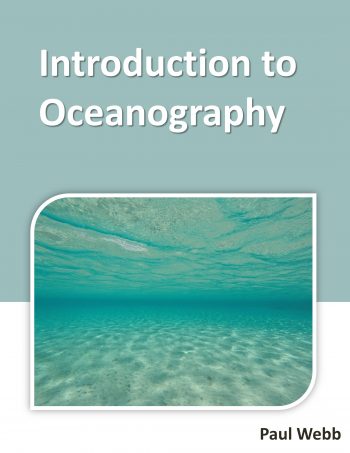
 Introduction to Physical Oceanography by Robert H. Stewart (2008): Texas A&M University
Introduction to Physical Oceanography by Robert H. Stewart (2008): Texas A&M University
This textbook covers physical-oceanographic processes, theories, data, and measurements, targeted at upper-division undergraduates and graduate students in oceanography, meteorology, and ocean engineering. In addition to the classical topics, the author includes discussions of heat fluxes, the role of the ocean in climate, the deep circulation, equatorial processes including El Nino, data bases used by oceanographers, the role of satellites and data from space, ship-based measurements, and the importance of vorticity in understanding oceanic flows. Students should have studied differential equations and introductory college physics, although math is de-emphasized.
 Introduction to Ocean Science 4th ed by Douglas Segar (2020): Segar
Introduction to Ocean Science 4th ed by Douglas Segar (2020): Segar
In this text, we will explore the fundamental physical, chemical, geological, and biological features and processess of the oceans and review how humans have studied the oceans. We will discuss the range of resources that the oceans provide for us, and the pollution and their impacts that result from humans on the oceans and exploitation of their resources. We will also examine oceans and exploitation of their resources. We will also examine the direct and indirect effects of climate change, not just on human civilization and natural ecosystems but also on the fundamental chemistry of the global ocean that pose a long-term threat of the extinction of many ocean species. After reading this text, you will have a new appreciation of the intimate and intricate linkages between our lives and the oceans. More importantly, you will be equipped to more fully analyze, understand, and evaluate the ever increasing stream of scientific and popular reports of findings or theories concerning the oceans and the implications of human activities on the oceans.
 Introduction to Oceanography by Paul Webb (2020): Reebus Community
Introduction to Oceanography by Paul Webb (2020): Reebus Community
This book was originally written for my Principles of Oceanography course at Roger Williams University, a lower-level introductory course required for marine biology and environmental science majors. By design, this course does not go into great detail about marine biological topics, as our students will cover those topics in their other courses. For that reason, this book does not currently include sections on marine ecology, marine communities, or the diversity of marine life that are often found in other introductory texts. However, this book remains a work in progress, and it is hoped that over time, those sections may be added. I invite instructors who utilize this text to send suggestions, edits, updates, or sections you would like to see added to pwebb@rwu.edu. I especially encourage instructors who are willing to author additional sections in their areas of expertise to submit them for inclusion in future updates to this text.
 Oceanography by Hill et al (2020): LibreTexts.
Oceanography by Hill et al (2020): LibreTexts.
Oceanography is the branch of Earth science that studies the ocean and covers a wide range of topics, including marine organisms and ecosystem dynamics; ocean currents, waves, and geophysical fluid dynamics; plate tectonics and the geology of the sea floor; and fluxes of various chemical substances and physical properties within the ocean and across its boundaries.






Oceanography (NASA)
Oceanography Book & Article List (IntechOpen)
Oceanography Books (National Academies Press)
Oceanography Bookshelf (LibreTexts)
Oceanography Course List (MIT OpenCourseWare)
Oceanography Resources (Library of Congress)
Oceans & Coasts (NOAA)
Project Oceanography (University of Florida)
Robert Ballard: On Exploring the Oceans (TED Talk)
